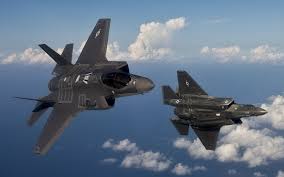Love them or hate them, you have to concede one thing to the Harper Conservatives: They are persistent. Some might say stubborn or high-handed, even when wrong-headed. Once they have embarked on a course, they do not let themselves be deflected — not by public opinion, not by the courts (the restoration of anti-prostitution laws being a current example), not by Parliament, not by expert opinion and certainly not by common sense.
The long drawn-out saga of the F-35 fighter aircraft is an example of the Conservatives’ refusal to heed both expert opinion and common sense. They have been committed to the Lockheed Martin F-35 Lightning, the most expensive warplane in history, ever since they took office in 2006. In 2012 — faced with production delays, performance issues, soaring costs (from an original estimate of $16 billion over the lifetime of 65 aircraft to a revised projection of $45 billion) and a devastating report by the Auditor General — the government ordered a review.
No one outside the government knows what the review, conducted in secret, involved. Did it look seriously at other (and cheaper) aircraft from other manufacturers? Did it assess whether the F-35 actually meets Canada’s military requirements? (And what, by the way, are those requirements? Maybe the Canadian public would like to know.) Did the review even consider the pilot-safety issue that would inevitably arise if the single-engine F-35 were deplored to patrol the vast distances across the far north and along Canada’s coastlines?
We don’t know these things because the Conservatives haven’t told us. But the review must have endorsed the F-35 because it found its way back to the cabinet agenda this past spring for a decision. In June, Prime Minister Stephen Harper, apparently not satisfied he could make a convincing case to the public, bought some time by removing the item from the agenda. The government bought some more time in September by deciding to spend unannounced millions to extend until 2025 the life of the CF-18, the 30-year-old twin-engine warplane that the F-35 is meant to replace.
These moves seemed to suggest that the Tories were punting a final F-35 purchase decision until after the federal election, scheduled for October 2015.
But things are not always what they seem to be in the worlds of politics and weapons acquisition. Last week, Canadians learned, courtesy of a leak from the U.S. Pentagon, that Ottawa is proposing to fast-track its acquisition of F-35s. (Why Canadians have to learn about important issues, anything from drug safety to military purchases, from the Americans rather than from their own government is an interesting question… But I digress.)
According to the leaked Pentagon briefing, Ottawa plans to send a letter of intent to Washington this month confirming that Canada will place an order for at least four F-35s by the end of this fiscal year (next March 31). The deal is this: the U.S. Air Force has four places on the F-35 production schedule for aircraft to be delivered in 2016 or 2017. The Royal Canadian Air Force would take those positions, and use those four aircraft for pilot training; in return the USAF would take four slots that are earmarked for Canada on the 2019 delivery schedule.
If, as we are told, no final decision has been made to buy F-35s, why the rush to order them? A cynic might suggest it has something to do with the polls. According to EKOS Research, concern about public safety, in the wake of terrorism-linked incidents in Ottawa and Quebec, has boosted the Conservatives’ standing as they rose from 12 points behind the Liberals a month earlier to just three points down today.
That movement was enough to cause Frank Graves, president of EKOS, to speculate that Harper might find it expedient to ignore the fixed-election law again and call a snap early election. In this scenario, a multi-billion dollar military purchase, plus a tough-on-crime domestic agenda, might be the ticket to re-elect the Tories. Or is this far too cynical?
Cambridge resident Geoffrey Stevens, an author and former Ottawa columnist and managing editor of the Globe and Mail, teaches political science at Wilfrid Laurier University and the University of Guelph. His column appears Monday in Waterloo Regional Record and Guelph Mercury. He welcomes comments at geoffstevens@sympatico.ca



